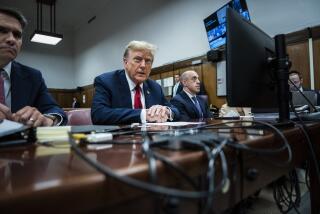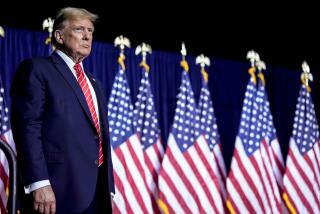Former Trump lawyer Cohen reveals new Russian outreach in 2016 campaign
Donald Trump secretly authorized his longtime lawyer Michael Cohen to try to arrange a meeting with Russian President Vladimir Putin in New York just three months after Trump had announced his White House bid, according to new disclosures from special counsel Robert S. Mueller III on Friday.
The proposed meeting between the real estate mogul and the Russian leader, who was visiting New York for the United Nations General Assembly in September 2015, did not take place. It’s unclear whether Russian authorities considered the offer, which Cohen made in a radio interview.
Two months later, Cohen spoke with a Russian national who claimed to be a “trusted person” in the Russian Federation. The person, who was not named in the court document, offered Trump’s campaign “political synergy” and repeatedly proposed a meeting between Trump and Putin.
The Russian said a meeting with Putin would have a “phenomenal” impact not only on Trump’s political career “but in a business dimension as well,” which prosecutors said was Trump’s decades-long effort to build a luxury hotel and condominium tower in Moscow.
Whether the offer for collaboration with Moscow was genuine isn’t known. Cohen did not pursue it because, prosecutors say, he already was working with another person “who Cohen understood to have his own connections to the Russian government.”
The previously unknown interactions flesh out how Trump’s personal financial interests repeatedly collided with his unconventional presidential campaign, the latest data points for the special counsel investigation into whether Trump or his aides assisted Russian interference in the 2016 election.
The Trump Tower Moscow project could have generated “hundreds of millions of dollars from Russian sources in licensing fees and other revenues” for the Trump Organization, the holding company for Trump family businesses, prosecutors wrote, estimating the project’s potential value for the first time.
The company, they added, “sought and likely required” Russian government assistance to build the Moscow tower.
The fact that Cohen discussed it with Trump “well into the campaign” was significant, prosecutors said, “particularly because it occurred at a time of sustained efforts by the Russian government to interfere with the U.S. presidential election.”
The details were revealed in a seven-page sentencing memo for Cohen, who has cooperated with Mueller’s office after pleading guilty to several crimes involving the president.
Cohen, who long served as Trump’s self-described fixer and as an executive vice president in the Trump Organization, admitted last month to lying to two congressional committees about pursuing the Moscow deal during the campaign. He said he was trying to shield the president from more scrutiny.
In August, Cohen pleaded guilty to violating campaign finance laws by arranging hush money for two women who said they had slept with Trump. Trump directed those payments, according to a separate sentencing memo filed Friday by the U.S. attorney’s office in Manhattan, which is investigating the scheme.
In their memo, the U.S. attorney’s office urged a federal judge to impose a “substantial” prison sentence on Cohen, recommending about four years behind bars. Mueller did not recommend a sentence for Cohen’s lies to Congress, but said the term should run concurrently with his other sentence.
Cohen is scheduled to be sentenced Wednesday in New York.
Trump has denied any collusion between his campaign and Moscow, and he tweeted Friday night that the latest court filing “totally clears the President.”
Sarah Huckabee Sanders, the White House spokeswoman, said that the filings “tell us nothing of value that wasn’t already known. Mr. Cohen has repeatedly lied and as the prosecution has pointed out to the court, Mr. Cohen is no hero.”
Cohen recently admitted to pursuing the Moscow project until after Trump clinched the Republican nomination, when it was shelved. Around that time, U.S. intelligence officials have concluded, the Russian operation began to focus on boosting Trump’s ultimately successful candidacy.
Mueller hinted that Cohen had provided additional details, not yet publicly disclosed, about Trump and Russia, saying he had shared “useful information concerning certain discrete Russia-related matters core to [the special counsel] investigation” into potential coordination between Trump’s campaign and Moscow.
Cohen is also a key figure in another federal investigation involving the president and hush money paid to Stormy Daniels, a porn star, and Karen McDougal, a former Playboy playmate. Both were paid to stay quiet during the campaign about their alleged affairs with Trump.
Prosecutors at the U.S. attorney’s office in Manhattan, which is handling that case, wrote that Cohen “acted in coordination with and at the direction of Individual-1,” a reference to Trump.
They were far less charitable than Mueller, describing Cohen as “a man who knowingly sought to undermine core institutions of our democracy.’’
In addition to the campaign finance violations, Cohen also pleaded guilty to tax evasion and bank fraud involving his taxi business and various mortgages.
“Cohen managed to commit a panoply of serious crimes, all while holding himself out as a licensed attorney and upstanding member of the bar,” prosecutors in New York wrote. “His offenses strike at several pillars of our society and system of government: the payment of taxes; transparent and fair elections; and truthfulness before government and in business.”
Cohen “repeatedly declined to provide full information about the scope of any additional criminal conduct in which he may have engaged or had knowledge,” they added.
In a separate court filing Friday in Virginia, Mueller’s team said Paul Manafort, Trump’s former campaign manager, had violated his plea deal with prosecutors by lying about his communications with a business associate in Ukraine, Konstantin Kilimnik, who U.S. officials say has ties to Russian intelligence.
Details of those communications were blacked out in the 10-page document.
Manafort also lied about his contacts with Trump administration officials, although the filing doesn’t say what was discussed.
Manafort was convicted in August of bank fraud and tax evasion tied to his work as a political consultant for Ukraine’s pro-Russia government. He later pleaded guilty to two counts of conspiracy to avoid a second trial on related charges, and he agreed to cooperate with prosecutors.
Manafort is scheduled to be sentenced in March. His defense lawyers have denied that he lied to prosecutors.
The sentencing memos and indictments offer the only public glimpses into the Russia investigation, which has been largely kept under wraps by Mueller’s team.
Earlier this week, the special counsel’s office submitted a separate sentencing memo for Michael Flynn, Trump’s former national security advisor. Flynn pleaded guilty last year to lying to FBI investigators about his conversations with the Russian ambassador during the presidential transition period.
Prosecutors did not recommend prison time for Flynn, saying he had assisted in multiple ongoing investigations by participating in 19 interviews and handing over his communications and other documents. He is scheduled to be sentenced on Dec. 18.
Trump has appeared agitated by the recent developments, fiercely criticizing the special counsel’s office in a series of tweets on Friday morning.
He accused Mueller of having “big time conflicts of interest” and said one of Mueller’s top prosecutors, Andrew Weissmann, had a “horrible and vicious” past in which “he wrongly destroyed people’s lives,” presumably a reference to his work as a federal prosecutor in white-collar and organized crime cases.
Trump also implied that Deputy Atty. Gen. Rod Rosenstein should not be allowed to supervise Mueller’s work, a suggestion that came just hours before the president announced he would nominate William Barr as the new attorney general.
Barr, who led the Justice Department from 1991 to 1993 under President George H.W. Bush, would likely oversee the Russia investigation if he is confirmed by the Senate. His predecessor, Jeff Sessions, had recused himself because he had served as a prominent Trump campaign advisor.
Twitter: @chrismegerian
More to Read
Get the L.A. Times Politics newsletter
Deeply reported insights into legislation, politics and policy from Sacramento, Washington and beyond. In your inbox three times per week.
You may occasionally receive promotional content from the Los Angeles Times.








